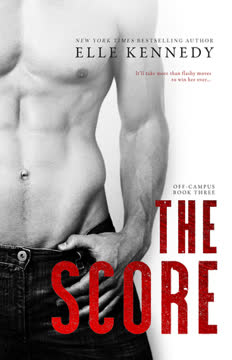Key Takeaways
1. Hunter's Celibacy: A Shield Against Inherited Flaws
What I learned after last year’s distractions cost my hockey team our entire season? No more screwing up. No more screwing, period.
A drastic vow. Hunter Davenport, the new captain of the Briar hockey team, begins his junior year with a self-imposed celibacy vow. This extreme measure stems from a disastrous previous season where his romantic entanglements led to a broken wrist and his team's failure to reach the national championship. He believes that abstaining from sex will eliminate distractions and allow him to focus solely on leading his team to victory.
Fear of repetition. Hunter's decision is deeply rooted in his family history, particularly his father's infidelity and narcissistic tendencies. He fears inheriting his father's "debauchery" and the destructive impact it had on his family. His celibacy is not just about hockey; it's a desperate attempt to prove to himself that he can control his impulses and avoid becoming the man he despises.
An internal struggle. Despite his firm resolve, Hunter's celibacy is a constant source of torment. He finds himself easily aroused by everyday interactions and struggles with intense sexual frustration, often resorting to solitary acts. This internal battle highlights the immense pressure he places on himself to be different from his father and a "good" captain, even at the cost of his own desires.
2. Demi's Blind Spot: The Unraveling of a Long-Term Love
We’ve been dating since the eighth grade. Our relationship has had its ups and downs over the years, with some breaks along the way, but we survived every single hurdle, and we’ll survive this, too.
A seemingly stable relationship. Demi Davis, a pre-med student with a passion for psychology, has been in a relationship with Nico since middle school. Their long history and shared experiences have created a sense of security and inevitability around their future together. Demi genuinely believes in their bond, often dismissing any doubts or external observations about Nico's character.
Ignoring red flags. Despite her intelligence and keen psychological insight, Demi exhibits a significant blind spot when it comes to Nico. She rationalizes his behavior, such as his lack of sexual enthusiasm or his evasiveness, and dismisses warnings from friends like Hunter. Her deep emotional investment and the comfort of their long-standing relationship prevent her from seeing the truth about his actions.
The illusion of perfection. Demi's family, particularly her parents, also hold Nico in high regard, viewing him as a future son-in-law. This external validation further reinforces Demi's perception of their perfect relationship, making it harder for her to confront any uncomfortable truths. The pressure to maintain this image contributes to her reluctance to question Nico's loyalty.
3. The Psych Project: A Mirror to Hunter's Past
When I opened my “PATIENT” envelope last week and saw the disorder I’d been assigned, I’d almost laughed out loud. Hardly any research required, as I’m wholly familiar with the symptoms and how it manifests. I’ve lived with it my entire life.
A revealing assignment. Hunter and Demi are paired for a year-long Abnormal Psychology project, where one acts as a psychologist and the other a patient. Hunter is assigned Narcissistic Personality Disorder (NPD) and chooses to base his "patient" persona, Dick Smith, entirely on his own father. This assignment becomes an unexpected therapeutic outlet for him.
Unpacking family trauma. Through the sessions, Hunter vividly describes his father's manipulative behavior, infidelity, and emotional abuse, all under the guise of "Dick Smith." He recounts painful childhood memories, such as witnessing his father's affair and being dismissed by his mother for trying to expose the truth. This process allows him to articulate and process long-suppressed feelings about his upbringing.
Demi's growing insight. Initially unaware that Hunter's stories are autobiographical, Demi meticulously analyzes "Dick Smith's" behavior, noting his lack of empathy and self-serving justifications. Her perceptive questions inadvertently push Hunter to confront his own past, making the project a profound experience for both of them and deepening their understanding of each other.
4. Unmasking Betrayal: The Truth About Nico
Corinne only set up her Wi-Fi a week after she’d moved in. There’s no way it could’ve been up and running when Nico was there days and days before.
Hunter's difficult revelation. Hunter, witnessing Nico leaving a bedroom with another girl at a frat party, feels compelled to warn Demi, despite his initial reluctance and fear of interfering. He cautiously shares what he saw, but Demi, still trusting Nico and wary of Hunter's motives, dismisses his concerns as "fear mongering."
The undeniable evidence. The truth eventually unravels at Corinne's housewarming party. Demi discovers Nico's phone automatically connects to Corinne's Wi-Fi, which she knows wasn't set up when Nico helped her move. This discrepancy, coupled with Corinne's guilty demeanor, forces Demi to confront the painful reality of Nico's infidelity.
A public confrontation. The revelation leads to a dramatic public confrontation where Demi exposes Nico's cheating, not only with Corinne but also with another girl at the party. Overwhelmed by betrayal, Demi physically lashes out at Nico and destroys his PlayStation, marking a definitive end to their eight-year relationship.
5. From Friendship to Forbidden Kiss: A Vow Challenged
After the season ends—She slants her head, defiant. —I get to be the one you cross the finish line with, friendship be damned.
A bond tested. Following her breakup, Demi finds solace and distraction in her friendship with Hunter. Their easy banter and shared humor provide a much-needed escape from her emotional turmoil. However, the platonic lines begin to blur as their attraction intensifies, leading to unexpected kisses.
Hunter's internal conflict. Despite his celibacy vow and his desire to maintain their friendship, Hunter struggles to resist Demi's allure. He's visibly aroused by her and admits to fantasizing about her, but he repeatedly pushes her away, fearing that a sexual relationship would complicate their bond and derail his hockey focus.
Demi's determined pursuit. Demi, now single and seeking a rebound, is increasingly drawn to Hunter. She playfully challenges his celibacy, even orchestrating a "Operation Jealousy" with his teammate Conor to provoke a reaction. Her persistence, combined with their undeniable chemistry, eventually pushes Hunter to break his vow, leading to their first sexual encounter.
6. Confronting Inner Demons: Hunter's Fear of His Father's Legacy
I’m afraid I’ll cheat. All those road games, all those hotel rooms and hotel bars, all those women throwing themselves at me. I know I don’t have a sex addiction, but I’ve got my father’s genes and they don’t exactly have the greatest track record.
The root of the vow. Hunter's celibacy is not merely a hockey strategy but a deep-seated fear of becoming like his narcissistic, philandering father. He confesses to Demi his apprehension about a professional hockey career, not due to lack of talent, but because of the "debauchery" and constant temptation that comes with the lifestyle. He believes his father's "genes" make him susceptible to infidelity.
Demi's unwavering support. Demi, having experienced betrayal firsthand, reassures Hunter that he is not his father. She highlights his distinct qualities—his loyalty, his empathy, and his commitment to personal growth—and challenges his self-punishing mindset. Her belief in him begins to chip away at his ingrained fears, offering a new perspective on his own agency and choices.
Breaking the cycle. Hunter's decision to break his celibacy for Demi marks a significant step in his journey of self-acceptance. It's a realization that he can control his impulses and build a healthy, faithful relationship, rather than being enslaved by a perceived genetic predisposition. This newfound confidence is crucial for him to reconsider his professional hockey aspirations.
7. A Friend's Silent Scream: The Crisis of TJ
Why didn’t you ever talk to me about any of this? Feeling ignored by your parents, feeling inferior to your brother, feeling like you wanted to… Die.
Unseen suffering. Demi's friend, TJ, a quiet and anxious individual, unexpectedly calls her from the roof of a dorm, threatening to jump. This shocking revelation exposes the hidden depths of his mental health struggles, which Demi, despite her aspirations to be a psychologist, had completely missed. His despair stems from feelings of invisibility and inferiority, particularly in comparison to his successful brother and his unrequited feelings for Demi.
Demi's courageous intervention. Despite her own terror and the dangerous, icy conditions on the rooftop, Demi climbs onto the ledge to be with TJ. She bravely engages him in conversation, trying to understand his pain and talk him down. Her honesty about her feelings for Hunter, combined with her unwavering presence, slowly begins to break through TJ's despair.
The gravity of mental health. The incident serves as a stark reminder of the silent battles many people face. It highlights the importance of open communication, empathy, and seeking professional help for mental health issues. Demi's experience, though harrowing, reinforces her commitment to a career in psychology, driven by a newfound understanding of its real-world impact.
8. Love's Ultimate Test: Prioritizing People Over Play
You mean more to me than hockey. Get it through your stubborn head.
A pivotal choice. Hunter is preparing for a crucial playoff game when he learns Demi is on a rooftop, trying to talk down a suicidal friend. Without hesitation, he abandons his game preparations, leaving his uniform half-on, to rush to her side. This act unequivocally demonstrates his priorities, placing Demi's safety and well-being above his lifelong passion and team responsibilities.
Father's unexpected support. Demi's father, Dr. Davis, who initially disapproved of Hunter, witnesses his genuine concern and unwavering support for Demi during the crisis. Hunter's calm demeanor and faith in Demi's ability to handle the situation, even while Dr. Davis is panicking, begin to soften the father's hardened stance. This shared experience bridges the gap between them.
The power of presence. Hunter's presence, along with Dr. Davis', provides Demi with crucial emotional support during an incredibly traumatic event. His simple declaration, "You mean more to me than hockey," solidifies their relationship and reassures Demi of his profound love and commitment, proving that true love transcends personal ambitions and external pressures.
9. Redefining Futures: Career, Love, and Self-Acceptance
I love you, Hunter Davenport.
Embracing true callings. The crisis with TJ, coupled with her ongoing self-reflection, empowers Demi to finally tell her father she will not pursue medical school. Instead, she commits to her passion for psychology, aiming for a master's and doctorate. This decision, initially met with disapproval, is a bold step towards her authentic self, supported by Hunter.
Hunter's renewed ambition. Inspired by Demi's belief in him and his own growth, Hunter reconsiders his professional hockey career. He connects with an agent, signaling his intent to pursue the NHL, confident that he can navigate its temptations without succumbing to his father's destructive patterns. Their mutual support allows both to chase their dreams.
A future together. With their relationship officially defined and their individual paths clarified, Hunter and Demi begin to plan a future that intertwines their lives and careers. Their journey, marked by personal struggles, unexpected love, and profound growth, culminates in a powerful affirmation of love, trust, and self-acceptance, setting the stage for a shared life built on mutual respect and unwavering support.
Last updated:
Review Summary
The Play receives mostly positive reviews, with readers praising the fun, steamy romance between Hunter and Demi. Many enjoy the friends-to-lovers trope and the characters' chemistry. Some criticize the portrayal of minority characters and find the plot predictable. Fans of Elle Kennedy's writing style and hockey romances generally appreciate the humor and banter. A few readers express disappointment with the pacing or character development. Overall, it's considered an entertaining addition to the Briar U series, though opinions vary on its quality compared to previous books.
Briar U Series
Similar Books
Download PDF
Download EPUB
.epub digital book format is ideal for reading ebooks on phones, tablets, and e-readers.

























